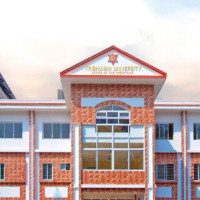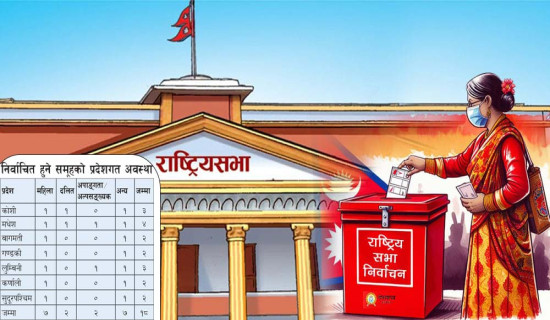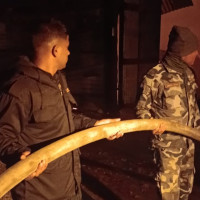- Sunday, 25 January 2026
Slow progress being made in Fast Track project
BY ANIL PARAJULI,Hetauda,Aug.2: The progress of Kathmandu-Tarai-Madhes Fast Track, a national pride project being constructed under the coordination of the Nepali Army, has reached only 35 per cent. The project was assigned to the Nepali Army as per the decision of the Council of Ministers on April 14, 2017.
The construction work commenced after the detailed project report (DPR) of the project was approved by the Council of Ministers on August 18, 2019. However, the project's progress has been sluggish.
According to Gaurav Kumar KC, Brigadier General of the Nepali Army and Information Officer, as of the end of the last fiscal year, the physical progress of the construction work was 35.38 per cent and financial progress including mobilisation was 36.66 per cent.
Brigadier General Bikash Pokhrel, head of the Kathmandu-Tarai-Madhes Fast Track project, said that the Nepali Army was accelerating the construction work lately. He informed that toll plazas would be constructed in Khokana, Budhune and Nijgadh.
Last fiscal year, purchase agreements for five packages were completed and have entered the implementation phase. According to the project's comprehensive action plan, 12 of the 13 construction packages, including package numbers 1 to 7, 8(a), 8(b), 9(a), 9(b) and 10, covering 6.5 kilometres to 70.96 kilometres of the fast track, are under construction and in the implementation phase. The purchase process for package number 11, covering 0 to 6.5 kilometres from Khokana, is planned to start after resolving issues related to the tunnel's end point, vehicle management decisions and land acquisition.
Brigadier General Pokhrel informed that packages 1 to 10 out of the 13 construction packages under the project's 11 clusters were at construction and implementation phase.
The Nepali Army has said that package number 11, covering the Khokana-Bungamati section, is still pending due to issues related to land acquisition, as well as decisions on the start point of the fast track and vehicle management.
The total length of the six tunnels under the project is 10.309 kilometres. According to statistics released by the Nepali Army, under package number 1 of the tunnel road, the total length of the Mahadevatar tunnel is 3,355 metres. Of this, 2,228 metres, or 68 per cent, of the right tunnel (out of 3,338 metres) has been excavated. Similarly, 2,020 metres, or 61 per cent, of the left tunnel (out of 3,322 metres) has been excavated.
Under package number 2, Dhedre tunnel has a total length of 1,691 metres. About 1,642 metres (95 per cent), of the 1,728-metre left tunnel has been excavated. The 1,653-metre-long right tunnel heading from Nijgadh to Kathmandu was broken through on May 24.
Under package number 3, the twin tunnels at Lendanda in Bakaiya and Gadhi rural municipalities of Makwanpur, the 1,612-metre-long tunnel from Nijgadh to Kathmandu was broken through a month ago and the 1,633-metre-long tunnel from Kathmandu to Nijgadh was broken through two months ago.
Under package number 4, the 1,000-metre-long Devichaur tunnel and under package number 5, the 390-metre-long Sisautar tunnel, the purchase agreements have been completed and are currently in the design phase, according to statistics released by the Nepali Army.
Under package number 6, portal preparation work is ongoing for the 2,250-metre-long Chandram Bhir tunnel.
Additionally, contracts for 85 out of 85 bridges have been managed, while three are delayed due to land acquisition issues.
According to Brigadier General Pokhrel, the foundations of most of the under-construction bridges have been completed, with five bridges finished so far. Out of the total 2,802 mounds needed for the under-construction bridges, 1,760 mounds have been excavated.
For land acquisition, as per the approved Environmental Impact Assessment (EIA) and Supplemental Environmental Impact Assessment (SEIA), out of the total required approximately 17,651 ropanis of land for the project, 5,487 ropanis are private land. So far, notifications for acquiring 5,204 ropanis of private land have been published, with 4,811 ropanis already acquired and 394 ropanis remaining. Among the remaining land, 206 ropanis in the Khokana-Bungamati section are in valuation and compensation distribution phase, and 165 ropanis are yet to be valued, making a total of 371 ropanis. Additionally, 16 ropanis in Makwanpur district and four ropanis in Kathmandu district are yet to be acquired.
As per the website of Nepali Army, 31,743 trees have been cut down so far. According to the decision of the Council of Ministers on December 28, 2023, out of 4,345 trees of various species approved for cutting, 3,335 have been cut down. In return, 705,552 saplings have been planted.
It is mentioned that additional land acquisition and tree cutting outside the pre-determined right-of-way have been approved in accordance with the revised design and re-alignment during construction. According to the supplementary Environmental Impact Assessment (EIA) report, for the Mahadevatar, Dhedre, and Lendanda sections from 26 to 35 kilometres, and the Rajdamar, Bagdev, and Nijgadh sections from 49 to 70 kilometres, land acquisition and tree cutting were approved on December 28, 2023, with cutting completed and in the process of being handed over.
Similarly, the supplementary EIA report for the Ranisera and Budhune sections from 35 to 49 kilometres was approved by the ministerial-level decision of the Ministry of Forests and Environment on April 19, 2024, and the process of tree cutting and land right-of-way acquisition is ongoing. The sub-base construction, bioengineering work, roadside construction, wall construction and service road construction for the fast track are progressing rapidly.
The total length of the Kathmandu-Tarai-Madhesh Fast Track road project, with its starting point at Khokana and endpoint at Nijgadh, is 70.97 kilometres. In 2017, the then Prime Minister Pushpa Kamal Dahal ‘Prachanda’ led the government to assign the construction responsibility to the Nepali Army with a goal to complete the work within four years. However, since the target to complete it by 2023/24 will not be met, the deadline has been extended to 2026. Initially, the project was to be completed with an investment of Rs. 175 billion, but the cost has now increased to Rs. 211.93 billion.
The contracts were awarded to six different Chinese companies, with collaboration from Nepali construction businesses. Once completed, the fast track is expected to reduce transportation time from the Tarai to Kathmandu by four hours, saving more than Rs. 50 billion annually on goods transportation.

.jpg)














